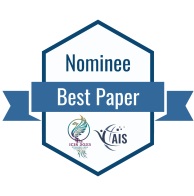Blockchain, DLT, and Fintech
Paper Number
2435
Paper Type
Completed
Description
Research on blockchain has found that the technology is no silver bullet compared to traditional data structures due to limitations regarding decentralization, security, and scalability. These limitations are summarized in the blockchain trilemma, which today represents the greatest barrier to blockchain adoption and applicability. To address these limitations, recent advancements by blockchain businesses have focused on a new cryptographic technique called "Zero-knowledge proofs". While these primitives have been around for some time and despite their potential significance on blockchains, not much is known in information systems research about them and their potential effects. Therefore, we employ a multivocal literature review to explore this new tool and find that although it has the potential to resolve the trilemma, it currently only solves it in certain dimensions, which necessitates further attention and research.
Recommended Citation
Principato, Marc; Babel, Matthias; Guggenberger, Tobias; Kropp, Julius; and Mertel, Simon, "Towards Solving the Blockchain Trilemma: An Exploration of Zero-Knowledge Proofs" (2023). ICIS 2023 Proceedings. 5.
https://aisel.aisnet.org/icis2023/blockchain/blockchain/5
Towards Solving the Blockchain Trilemma: An Exploration of Zero-Knowledge Proofs
Research on blockchain has found that the technology is no silver bullet compared to traditional data structures due to limitations regarding decentralization, security, and scalability. These limitations are summarized in the blockchain trilemma, which today represents the greatest barrier to blockchain adoption and applicability. To address these limitations, recent advancements by blockchain businesses have focused on a new cryptographic technique called "Zero-knowledge proofs". While these primitives have been around for some time and despite their potential significance on blockchains, not much is known in information systems research about them and their potential effects. Therefore, we employ a multivocal literature review to explore this new tool and find that although it has the potential to resolve the trilemma, it currently only solves it in certain dimensions, which necessitates further attention and research.
When commenting on articles, please be friendly, welcoming, respectful and abide by the AIS eLibrary Discussion Thread Code of Conduct posted here.




Comments
07-Blockchain